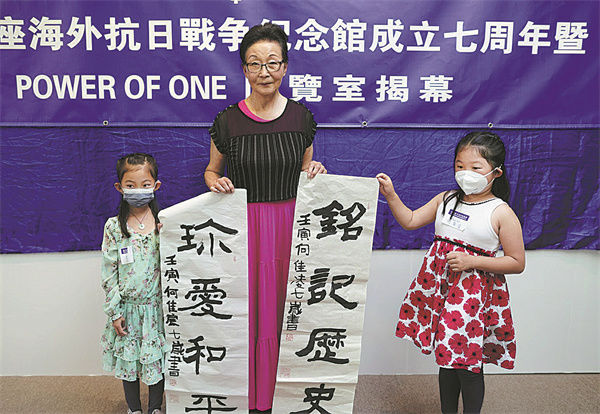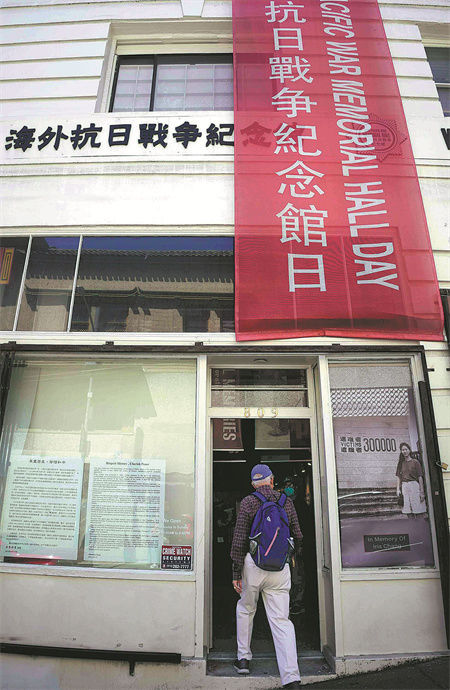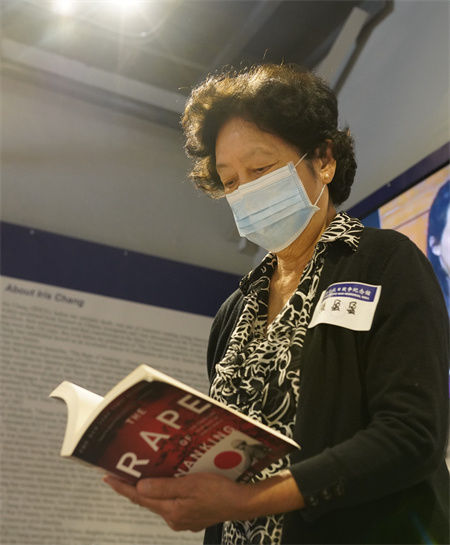
Two students give their Chinese calligraphy work-"remember the history and cherish peace"-to Florence Fang (center), founder of the San Francisco WWII Pacific War Memorial Hall, as a gift, during the opening ceremony of the Power of One Reading Room on Saturday.[Photo provided to China Daily]
"Please believe in the power of one. One person can make an enormous difference in the world. One person-actually, one idea-can start a war, or end one, or subvert an entire power structure."
The quote from Iris Chang, the late Chinese American historian and author, has inspired more people to retrace her footsteps to seek and preserve the truth in the history of Chinese people's War of Resistance Against Japanese Aggression (1931-45).
A reading room is dedicated to Chang at the San Francisco WWII Pacific War Memorial Hall, where visitors can read the writer's books, learn about her life and study the chapter of history she tried to preserve.
Chang is best known for her book, The Rape of Nanking: The Forgotten Holocaust of World War II, which chronicled the massacre and the atrocities committed by the Japanese Army during the War of Resistance Against Japanese Aggression.
The massacre unfolded when Japanese troops captured the city of Nanjing on Dec 13, 1937. Over a period of six weeks, they killed 300,000 Chinese civilians and unarmed soldiers. But this horrific mass killing is often overlooked internationally, compared with other atrocities committed during World War II.
When Chang's book was published in 1997, it became a best-seller, introducing the Nanjing Massacre to many Western readers for the first time.
"We name the reading room 'Power of One' because we hope her belief in the power of an individual can influence the next generation and other ethnic communities as well," Betty Yuan, a council member of the San Francisco WWII Pacific War Memorial Hall, tells China Daily.

The memorial hall welcomes a visitor.[Photo provided to China Daily]
On display in the Power of One Reading Room, in memory of Iris Chang, are three panels of photos and texts, showing Chang's life, her book, The Rape of Nanking and a memorial hall dedicated to Chang in Jiangsu province.
The reading room will introduce other people who share the same spirit of assiduously seeking truth in history like Chang, says Yuan.
"We plan to invite historians and those, or the descendants of those, who experienced World War II, to give talks. We will also organize museum tours for students in the Bay Area," she says.
Since it was opened to the public on Saturday, two groups of elementary school students have visited the reading room. Two of the students gave their Chinese calligraphy work-"remember the history and cherish peace"-to Florence Fang, founder of the memorial hall, as a gift.
"Iris Chang is a hero. She helps the world remember one of the darkest moments in human history. She tells us history should not be forgotten," says Jennifer Cheung, president of Global Alliance for Preserving the History of WWII in Asia, a nonprofit grassroots organization with dozens of chapters in North America.
Cheung also serves as the chair of the Rape of Nanking Redress Coalition, an organization of Asian Americans seeking redress from the Japanese government.
"She inspires me to retrace her footsteps and keep seeking justice for the victims," says Cheung. "We must fight for justice and make the Japanese government formally apologize and compensate the victims."

Ying-Ying Chang, Iris Chang's mother, attends the opening ceremony of the reading room dedicated to her daughter.[Photo provided to China Daily]
Born in 1968 to two university professors who immigrated to the United States from China, Iris Chang grew up hearing stories about the Nanjing Massacre. The Rape of Nanking was motivated, in part, by the stories of her own grandparents about their escape from the massacre.
Her book remained on The New York Times best-seller list for 10 weeks. Based on the book, a US documentary film, Nanking, was released in 2007.
Chang also wrote two other books documenting the experiences of Chinese and Chinese Americans in history. During her research for her fourth book, in 2004, at the age of 36, Chang took her own life after losing a battle with depression.
In 2017, her ancestral home, Huaian city in Jiangsu, built a memorial hall in tribute to her contributions in preserving a key chapter of Chinese history.
Chang spent her last days in San Jose, California, where a park bearing her name in honor of her contribution to the local, national and global community, was inaugurated in 2019. In the park stands a monument which bears Chang's quote about the "power of one".
"When Iris revisited her high school (Uni High at Champaign-Urbana, Illinois), she delivered this speech about the power of one," Ying-Ying Chang, Iris' mother, tells China Daily.
"One discovery can cure a disease, or spawn new technology that can benefit or annihilate the human race. You are one individual and can change millions of lives. Think big. Do not limit your vision, and do not ever compromise your dreams or ideals," she says, quoting her daughter's speech.





